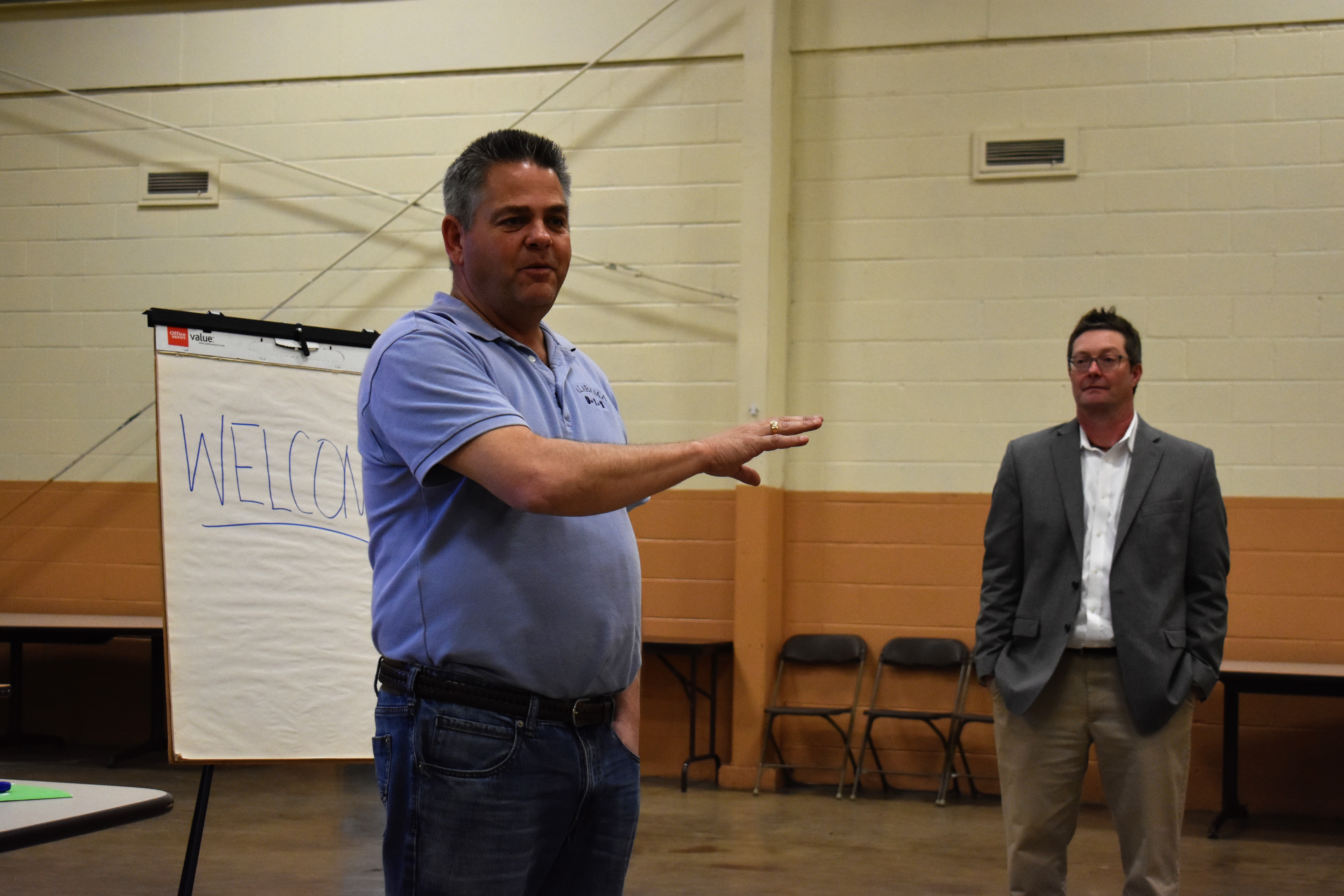Hanceville Mayor Kenneth Nail introduces Joey Hester, who heads up the city’s ACE team, at Tuesday's meeting. / W.C. Mann
HANCEVILLE – The city of Hanceville on Tuesday evening completed phase one in its quest to achieve accreditation as an Alabama Community of Excellence (ACE). The three-phase project is geared toward developing community programs and tools for long-term economic success. When Hanceville completes the process, it will be the first municipality in Cullman County and only the second in this part of the state (along with Hartselle) to hold an ACE designation.
On Tuesday evening, the city received its community assessment report from the captain of its assigned ACE team, Joey Hester from the North Central Alabama Regional Council of Governments (known as NARCOG). The ACE program works to help municipalities develop leadership, long-term strategic planning, business and local economy, and quality of life.
Said Hester, “I think what ACE brings to a community is a lot of resources. The members on any given ACE team, they’re volunteers; they represent a wide spectrum of different backgrounds, whether it’s economic development, tourism, historic preservation, planning, healthcare, education . . . They bring that expertise and knowledge to the community to help improve that community through the three-phase ACE process.”
Hanceville’s ACE team includes (with organization and area of expertise):
- Joey Hester, NARCOG, planning
- Alex Flachsbart, Balch and Bingham LLP, economic and industrial development
- Christina Argo, NARCOG, education
- Carolyn Bern – Alabama Department of Public Health, healthcare
- Trisha Black, Main Street Alabama, community development
- Theresa Carlisle – USDA, infrastructure
- Mary Helmer – Main Street Alabama, community development
- Tami Reist – Alabama Mountain Lakes Tourism Association, tourism
- Mary Shell – Alabama Historical Commission, historic resources/quality of life
- John Vandiver – USDA, infrastructure
- Nathan Willingham – North Alabama Council of Local Governments, leadership development
Hester also introduced Betty Dover as the new local ACE coordinator; Dover is taking over for Rhonda Lockhart, who helped Hanceville through its initial ACE application. He also named the local community leaders who will work with the ACE team in each area of focus:
- Planning – Mayor Kenneth Nail, Nolan Bradford, Tim Burney, John Wayne Fore, Haley Pitts
- Infrastructure – Rusty Fields, Nathan Finley
- Economic/Industrial Development – Shawn Bennett, Leah Bolin, Paula Garrett, Dale Greer, Peggy Smith
- Community Development – Leah Bolin, Ashley Graves
- Tourism – Leah Bolin, Roger Steele
- Leadership Development – Leah Bolin, Brian Poole
- Education – Kristi Barnett, Kim Brown, Suzanne Harbin, Jimmy Collins
- Healthcare – Roger Mayo, Sabrina Nail
- Historic Preservation/Quality of Life – Betty Dover, Ashley Dye, Steve Barnett
Tuesday evening’s presentation focused on the team’s observations about current conditions and resources in Hanceville, and on recommendations for next steps for the city. Noting both strengths and weaknesses in its observations, the ACE team’s recommendations included training of all city leaders in ACE’s principles, expanding the relationship between the city and Wallace State, developing and maintaining infrastructure, increasing available housing, increasing graduation rates and reducing dependency on free and reduced meals at Hanceville schools, working with agencies like the Cullman Area Rural Transportation System (CARTS) to improve access to healthcare facilities for local residents, promoting Hanceville’s relationship to the Shrine of the Most Blessed Sacrament (one of the region’s biggest tourist attractions), developing more community events like the recent Irish Heritage Celebration, and making the city more accessible and attractive to Wallace State students.
According to Hester, identification as a Community of Excellence can give a city an advantage when recruiting business and industry.
“If all goes well–and it’s a tall order,” said Hester, “I would love to get Hanceville ready to graduate next May (2019) at the Alabama League of Municipalities Conference . . . I’m very proud of Hanceville. I think there’s lots of opportunities, lots of potential here. You know, in all the years I’ve been involved with different projects here in Hanceville, I’ve seen the potential and I’m just very excited about what the future has in store for Hanceville, and looking forward to working with them.”
ACE program phases
Phase I: Assessment
An ACE team of experts across a range of topics visits the community, and based on its observations develops a comprehensive “report card” detailing community assets and recommending possible strategies.
Phase II: Leadership development and strategic planning
With guidance from a skilled ACE facilitator, the community develops a strategic plan, including formal vision and mission statements and goals and actions items for implementing the strategies. Phase II also includes establishment of an ongoing Leadership Development Program.
Phase III: Implementation and comprehensive planning
During Phase III, the community begins implementation of the strategic plan created during Phase II, and initiates work on a comprehensive plan that will be a long-term guide for development of infrastructure and community facilities.
Graduation
Upon successful completion of all three phases, communities are designated an Alabama Community of Excellence. Graduating communities are recognized at the Alabama League of Municipalities annual convention.
For more information on the ACE program, visit www.alabamacommunitiesofexcellence.org.
Copyright 2018 Humble Roots, LLC. All Rights Reserved.



















